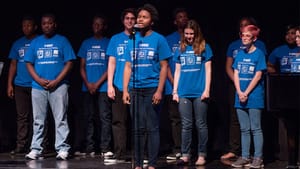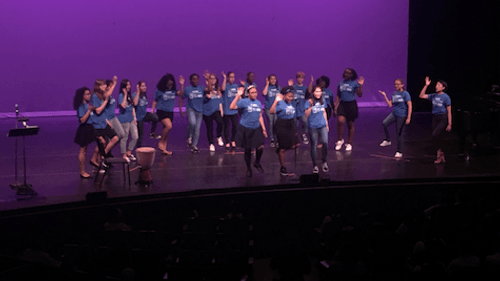Stay in the Loop
BSR publishes on a weekly schedule, with an email newsletter every Wednesday and Thursday morning. There’s no paywall, and subscribing is always free.
Representing the present and future of the arts
Annenberg Center presents T-VOCE

We hear a lot about representation in the arts these days, including efforts to showcase the work of women, people of color, and LGBTQ people. But there’s another kind of representation that may be more crucial to the long-term survival of the arts than any of these: the representation of young artists.
This was on my mind when I headed to the Annenberg Center to catch a performance by Teen Voices of the City Ensemble (T-VOCE, pronounced vo-chay, like the Italian for “voice”). T-VOCE was formed in 2016 in partnership with Art Sanctuary, Opera Philadelphia, and the Annenberg, “with the goal of empowering and celebrating the voices of young people.” As Art Sanctuary executive director Valerie Gay explained to a school-group audience, there are no auditions and no cuts in the T-VOCE program. It’s open to all Philly youth ages 13 through 19, and participation is free.
The May 18 medley of choral and solo songs and original spoken word pieces, plus performances from the Esperanza Academy Dance Ensemble, was presented as part of Art Sanctuary’s 33rd annual Celebration of Black Arts Festival, in collaboration with Annenberg’s 2017 Philadelphia Children’s Festival (which ran May 18 to 20).
“Sanibonani” and civil rights
The show kicked off with a stirring choral rendition of a South African greeting song, “Sanibonani” (a word that means a plural hello in Zulu), from a semicircle of teens of every color.
A string of voice and dance numbers drew audible waves of admiration from the elementary and middle-school audience. Other songs performed included African folk song “Emarabini,” Sam Cook’s “A Change Is Gonna Come,” the U.S. civil rights anthem “We Shall Not Be Moved,” and Amber Ruiz’s gutsy solo rendition of Ruth B.’s “Lost Boy,” with Ruiz accompanying herself on piano.
The dark content of several spoken-word pieces was an undeniable sign of the times, including a narrative on police violence, “All Lives Matter,” written and performed by T-VOCE member Juanita Lingham, an African-American teen. “Black, white, Asian, Hispanic, we all gettin’ killed these days,” she said. “Shoot me if you dare and see who don’t care.” Her poem was doubly sobering given the youth of its author as well as its audience. Police brutality is a fact with which even our youngest citizens must grapple.

T-VOCE singer Shakira Jackson offered her own untitled rap, about the discrimination, violence, financial worries, and workplace challenges of everyday life, but with her own spin on success. With a nod to putting college and knowledge before marriage, she expressed her determination to “turn that laugh into a jaw drop” for anyone who thinks she can’t achieve her goals.
Another untitled poem, written and performed by Jaulie Cantave, asked what we can do to get through to men in a society that makes male emotions taboo: “How do you love a man who has been told not to feel?”
On stage and in the audience
In all, the superior quality and themes of the performance were a reminder of how, when given the opportunity, our youngsters can represent themselves not only as performers but as all-around creators, lending their voices as well as their own words and feelings.
And ultimately, questions of representation for adult artists of any stripe may be irrelevant if we can’t start with the more fundamental goal of arts forums for children, where they not only experience the arts but do so through the words, voices, and bodies of other youngsters in a professional setting.
An audience packed with kids is important, too: Representation isn’t just about who you see onstage, but who you see in the seats around you. Sustaining the arts is probably just as much about an audience which reflects the city’s true makeup as it is about who’s onstage, and ideally, diversity in one is an ongoing loop to diversity in the other.
I hope programs like T-VOCE continue to flourish, representing both the present and future of Philly’s arts scene. Those who participate in and experience the arts at a young age alongside their peers are probably even more likely to be tomorrow’s advocates for parity.
What, When, Where
Celebration of Black Arts Festival. Art Sanctuary of Philadephia. Through May 31, 2017, at various locations. (215) 232-4485 or celebrationofblackwriting.org.
T-VOCE: To apply for membership, click here.
Sign up for our newsletter
All of the week's new articles, all in one place. Sign up for the free weekly BSR newsletters, and don't miss a conversation.

 Alaina Johns
Alaina Johns